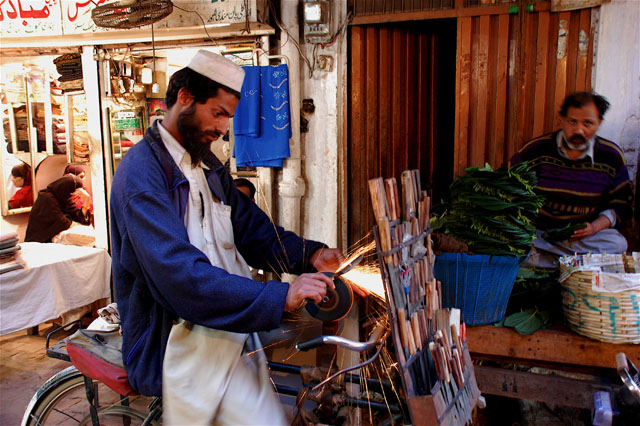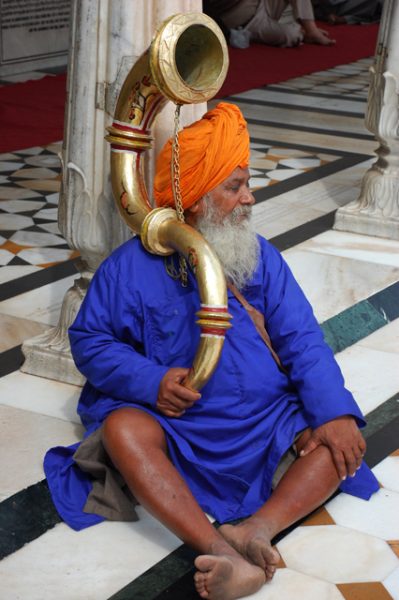Excerpts from A Fistful Of Rupees
There is a train to Dharmavaram at 5:00 for fifty-seven rupees. That allows about fourteen minutes buy a platform ticket, retrieve my pack from left luggage, buy some food and find the train. With three bananas and two half-assed oranges cradled in my arm I head for the train. I am hyped-up and happy (not to mention full of pizza). The sheer exhilaration of knowing I won’t have to spend another hour in Bangalore, has me making Three Stooges wooh wooh sounds as I rush through the station looking for platform number two. When I reach the platform, three different conductors give me three conflicting opinions on where the third-class bogeys are. At the front of the train what looks like a third-class car is full. I never find the one in the middle. I get sent to the last coach and get in. The seats are wooden slats. It’s a little better than a cattle car. I put my bag down and sigh with relief as Bangalore City Railway Station falls away. I’m looking around for a seat when I notice a man and his wife staring up at me, faces contracted with unstrung dismay. “This is ladies’ car,” says someone’s hubby. The whole car comes alive like an invaded hen house. I go into the next coach, which looks like a second-class sleeper. I figure to let the ticket-wallah straighten it out. When I check my money belt for my ticket I notice on the back a quotation from Gandhi. “Tolerance for other FAITHS imparts to us a truer understanding of our own.”
Gandhi who for all his compasion and wisdom was a blithering technophobe, abhorred the British built rail system.
“Good travels at a snail’s pace — it can, therefore, have little to do with the railways. Those who want to do good . . . are not in a hurry . . . But evil has wings . . . So the railways can become a distributing agency for the evil one only. It may be a debatable matter whether railways spread famines, but it is beyond dispute that they propagate evil . . . God set a limit to man’s locomotive ambition in the construction of his body. Man immediately proceeded to discover means of overriding the limit . . . Railways are a most dangerous institution.”
Two stops out of Bangalore a group of businessmen get on and start a card game. At first there are only three players. At the next stop another man joins them. The stakes get higher. People from all over the car crowd around the players furiously rubbernecking. Cigarette smoke gets thick and blue. Whiskey bottles come out. The crowd talks in low whispers. When the card players become boisterous; the crowd gets quieter. I feel like I’m in the middle of a scene from a Satyajit Ray film. At the next stop many passengers get off. The ride becomes noticeably bumpier. I wonder if it’s the result of a lack of ballast or are the rails more deteriorated further south? A few stops further the card players all get off.
I doze and when I wake up it’s pitch black outside. There’s only one other passenger, sitting by himself at the other end of the car. The next time I look, he’s gone. The air has become chilly; I put on a jacket. I’m tired but can’t fall asleep. I sense someone out there in the country dark at the edge of a meadow in a cardboard shanty with his back to the door, stirring the coals of a dying campfire; lithe flames dance across the coals like little blue and orange nautch girls. The man out there in the shack is nobody special; just another sleep failure, a smoke eater with heavy lids and dreaming jewels, heart like an unmarked grave. Awakened from dreams of a Southbound Train, he lights his last cigarette.
Sitting up straighter I crack the window; cold night mist blows across my burning eyes like icy satin. Dharmavaram will roll up soon and I’ll get off. Huffing and clacking, this old ghost train with its one empty car, will blow on past candle-shack drifters in the country lanes of Southern India’s crow-black night until at last it creeps into a steambound and weary rural terminus where ticketless nomads and freight-train Buddhas wait patiently for the arrival of the minions of Yama, the god of death, coming through the fields to lead them home.
In Banares
As a painfully shy sixteen-year-old I went on a bicycle tour with a group of kids back in the sixties. Half-way across Europe I ditched the group and took off knowing two or three words of French and German and no Italian. I sometimes went days without a real conversation, and was content just to observe, like a human camera. Wherever I went, I always felt safe, as if someone was watching over me. After several months of this I met an English girl in Bern and ended up living at her parents house in Southall. And while it was great to be able to have normal conversation and cute girl to cuddle, I remember feeling like my escape into the unknown had ended and that I was now boxed into the world of other people’s expectations and other people’s definition of the world around me.

While roaming about Banares in the the back-alleys and crumbling ghats of the world’s oldest living city, that quiet sense of meditative speculation is reborn, the visual narrative unfolding, the heady potential for the new and the unknown contained in each approaching sound, smell, color; textures of light and shadow; especially the shadows. It’s easy to find contentment just spending the day floating on a cushion of youthful wonderment. At times, while wandering the streets, some pang of sadness, some shred of grief may call upon me, demand my attention — but then like a crying child looking over a parent’s shoulder, my attention is easily stolen away by a winking eye, the smile of a passing stranger; Mother India, for whom all drama and the sorrows I will set aside, like a plaything grown tedious.
Increased familiarity with things Indian brings with it the danger of “knowing the price of everything and the value of nothing.” Sometimes Luke, you just have to use The Force. I don’t really need to “understand” the October sunset descending across the rooftops, or the way it swirls down into pennants of saffron colored light filtering through ganja and incense smoke rising from a narrow shack in a dark alley crammed with calico goats and sleeping dogs. Some things you just have to feel with your heart. Experiencing India is a lot like meditating. If you get caught up in excessive speculation — you ain’t doing it right. Sometimes you’ve got to fall backwards laughing in the surf, let the chaos wash over you like a wave. Horn-honking scooterheads squid past only inches away sliding sideways in piles of fresh fragrant cowshit — which some people are slow to realize, smells good and natural — a momentary absence of any strong smell subtly steals your attention and then there’s a wave of dal, red onions and other savories being flung into a large black frying pan, a mongoose family prances on a wooden table in the vestibule of a tailor shop, in a narrow alley the hand of a spice merchant threads unbidden through the crush of bodies to rub fingertips of lemongrass and patchouli on your arm, a flashing band of gold along the hem of an iridescent red silk sari in a smoky kitchen begs for your attention and then is gone, grimy five-year-old beggars tug at your sleeve, purgatory dogs chase starveling alley cats; cows, in their gracious bovine patience stand in front of a tea shop being milked, sweetmakers sit behind ziggurat counters stacked high with candies and pista badam covered with glistening black flies, brown-faced baboons with squinty old man eyes peer down from verandahs and ledges eyeing the traffic, navigate the shadows, charged with mischief, choosing targets, scampering about like demented souls accidentally misplaced in wrong bodies and just when you’re totally overwhelmed by the incomprehensibility of it all, when your brain is about to cry out for a more orderly vision, the world stops moving as you stop to watch a young girl chase after a stray rupee rolling across the pavement. Now you’ve come to a halt, standing alone in the middle of the sidewalk — Allah hu-Akbar! The azan is being sung in the mosque down the alley you just passed. The muezzin sings the part that tell us, “Prayer is better than sleep.” It is the hour of the bride; noise and confusion seep away as last rays of the dying sun set upon a lamb in front of a butchershop pawing feebly at its tether. In front of the butchershop a large bald Gujarati Muslim sits on a three-legged stool which has all but disappeared beneath his girth. A smoking beedi protrudes from the shaving cream that the hajjam carefully strokes away with an old ornate straight razor. On the fatman’s lap lying peaceful as apples fallen from a tree are two small boys and a tiny girl, her eyes rimmed with kohl; the trio are fast asleep. Unable to comprehend her situation the lamb bleats pleadingly at the passersby. The barber’s customer looks up to be certain someone isn’t molesting the lamb which he is fattening for the feast of the coming Idul-Zuha. But today’s fasting will end not with lamb, but with the traditional lime sherbet and dates. Puffing on his beedi he closes his eyes again and drowses while the barber finishes the shave. Moments like this can be easily missed if you’re too caught up in pigeonholing and comparing and nervously recounting the paise in your pocket.
The Bus To Bilgiri Rangana Hills

The 9:00 a.m. bus to BR Hills leaves the station promptly at 8:40 — with me on it. As soon as the bus is in the road I have a desperate need to pee. Comforting myself with the belief that the bus will stop for five minutes at Nanjangud Station forty minutes down the line I clench my knees together and try to concentrate on the scenery. Ten minutes into the ride I feel like I’m gonna die if I don’t pee. Fifteen minutes further on I’m hardly thinking about it. When the bus does stop I’m told to get off and wait by the bus. However when it starts up again I’m told it’s going to an entirely different terminus. Apparently the clerk at Mysore, although he spoke decent English, has fed me yet more misinformation. There is no straight through bus; it terminates right here in the middle of nowhere. After much gesturing and pidgin Hindi I get directions to Chamaranagar, a two hour walk, where I will be able to get a bus that will continue on to BR Hills.
One of the great pleasures of travel is experiencing untainted otherness. In an effort to maintain this feeling I have developed a sort of mental filter that helps lessen the impact of zillions of Pepsi ads and American myth films like Batman and Nightmare On Elm Street. As the connecting bus humps and bumps down dirt roads through rural villages in Southern India we continue to pass torn remains of posters for Jurassic Park and Star Trek wheat-pasted to the sides of chai stands and 200 year-old temples. The part of my mind that filters out this stuff is working overtime. The site of flickering black and white televisions inside rough-hewn coconut shacks is a niggling reminder of unrelenting 20th century progress. Even villages consisting of the most rudimentary daub and whattle huts possess satellite dishes with multiple feed-outs allowing entire villages to simultaneously watch nightly re-runs of Kojak episodes offered by the Arab run satellite stations.
At the next station I get out and take a seat on the curbing and make entries in my journal while waiting for still another connecting bus. Instantly, I am surrounded by small skinny barefoot children and teenagers. The few white people these kids have ever seen were on television and so, they will inspect me for as long as it takes for them to be absolutely certain that I am not Michael Jackson or Kojak. The wait for the bus is mercifully brief.

A little way out of town the road turns to mud and there are no more signs in English. As the bus begins to pick up speed, a swarm of Gray Pansy butterflies rush up to engulf the bus windshield,and then scatter into the wooded shadows of the jungle. The afternoon sun effortlessly induces a brief midday heat coma, from which I wake, thick, sleep-sweaty to a sound like the continual dropping of massive silverware drawers as the bus negotiates a series of craterous potholes before coming to a stop. I sit up straight and look around. The air all around us is surreal with butterflies. Three brightly painted elephants are lined up by the side of the road as if cuing for the bus, making everything around them seem somehow diminished. Sitting at the back of the bus is a frail old man in a tattered dhoti with a large sack. While waiting for the aisle to clear enough for him to negotiate it, he repeats a sad mantra, “forest gone, forest gone, forest gone.” I postulate then, how perhaps, his soul has been rent asunder with sorrow over the way avaricious Indian business combines and Nepali teak-pirates have betrayed Gandhiji’s utopian dream, stealing away with the hopes of future generations by stripping away the forests of his beloved India. His mantra “forest gone, forest gone, forest gone” becomes more strident as he struggles from his seat and makes his way from the back of the bus. The grief of his betrayal is heart rending. I don’t know how everyone can ignore the old man’s cries. I have half a notion to run over and hug the old guy. At the very least I thought, I should help him off the bus with his enormous sack. As I begin to rise from my seat the man seated behind me taps my shoulder.
“Why looking so sad? He is telling all that he is Forest Gump.”
“Oh, thank-you.”
With half the passengers gone I am able to move to the front. The lack of an entrance/exit stairwell at the front of the bus allows me to sit across from the driver in the shotgun seat. As the bus starts to move, clouds of butterflies and three-inch darning needles rush at the windshield, a galaxy of winged stars and comets.
–Christian X. Hunter
Stories
Wonderful reminders of India. Thank you Christian. I feel blessed to have had my feet soiled in cow dung, and skin caked with bright powder pigments. Its really where we get to be children again, everything twinkling tinsel and sequins and tinged green with florescent bulbs, walking barefoot in pajamas, eating off the palm of our own hand.
I once put a long letter into the complaint box in the Varanasi railway station and laughed at the burning up of griefs as the words dropped into that fire that silence. It’s no one’s fault. Mine, if only for suffering.
Hi,
I went to India six times and traveled, going on pilgrimage, visiting temples and major cultural sites and seeing the country all around.
I liked your evocation of the wide array of sights and scenes of everyday life.
For me, the most important thing about India is not the colorfulness, but the inherent spirituality. India is where I found the spirituality I continue to pursue.
Shiva Das